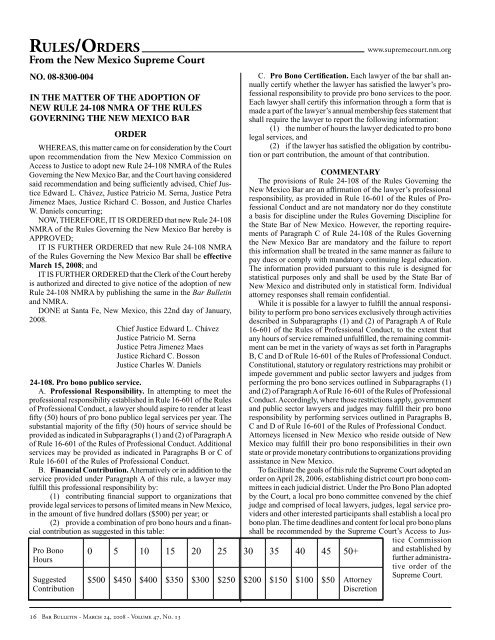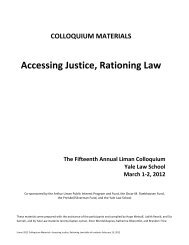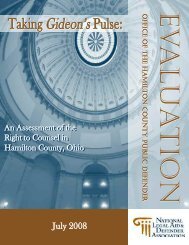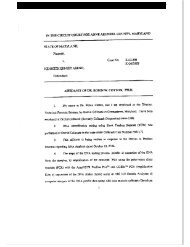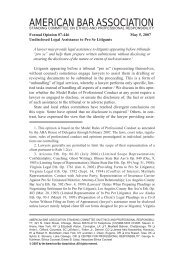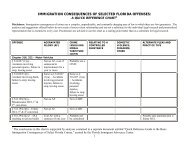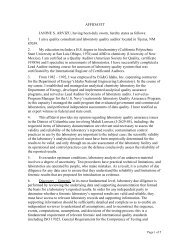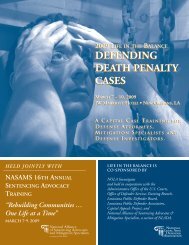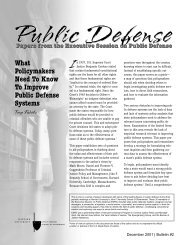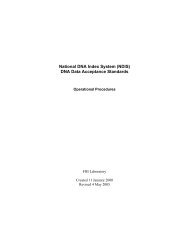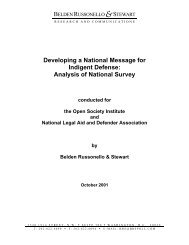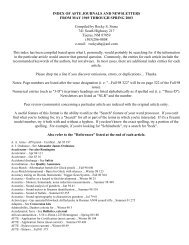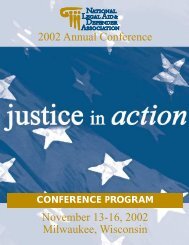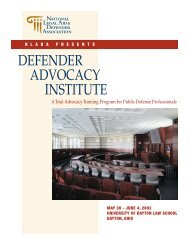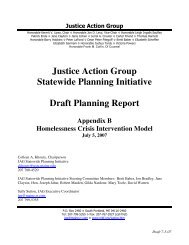New Mexico pro bono rules
New Mexico pro bono rules
New Mexico pro bono rules
Create successful ePaper yourself
Turn your PDF publications into a flip-book with our unique Google optimized e-Paper software.
Ru l e s/Or d e r s<br />
From the <strong>New</strong> <strong>Mexico</strong> Supreme Court<br />
NO. 08-8300-004<br />
IN THE MATTER OF THE ADOPTION OF<br />
NEW RULE 24-108 NMRA OF THE RULES<br />
GOVERNING THE NEW MEXICO BAR<br />
ORDER<br />
WHEREAS, this matter came on for consideration by the Court<br />
upon recommendation from the <strong>New</strong> <strong>Mexico</strong> Commission on<br />
Access to Justice to adopt new Rule 24-108 NMRA of the Rules<br />
Governing the <strong>New</strong> <strong>Mexico</strong> Bar, and the Court having considered<br />
said recommendation and being sufficiently advised, Chief Justice<br />
Edward L. Chávez, Justice Patricio M. Serna, Justice Petra<br />
Jimenez Maes, Justice Richard C. Bosson, and Justice Charles<br />
W. Daniels concurring;<br />
NOW, THEREFORE, IT IS ORDERED that new Rule 24-108<br />
NMRA of the Rules Governing the <strong>New</strong> <strong>Mexico</strong> Bar hereby is<br />
APPROVED;<br />
IT IS FURTHER ORDERED that new Rule 24-108 NMRA<br />
of the Rules Governing the <strong>New</strong> <strong>Mexico</strong> Bar shall be effective<br />
March 15, 2008; and<br />
IT IS FURTHER ORDERED that the Clerk of the Court hereby<br />
is authorized and directed to give notice of the adoption of new<br />
Rule 24-108 NMRA by publishing the same in the Bar Bulletin<br />
and NMRA.<br />
DONE at Santa Fe, <strong>New</strong> <strong>Mexico</strong>, this 22nd day of January,<br />
2008.<br />
Chief Justice Edward L. Chávez<br />
Justice Patricio M. Serna<br />
Justice Petra Jimenez Maes<br />
Justice Richard C. Bosson<br />
Justice Charles W. Daniels<br />
24-108. Pro <strong>bono</strong> publico service.<br />
A. Professional Responsibility. In attempting to meet the<br />
<strong>pro</strong>fessional responsibility established in Rule 16-601 of the Rules<br />
of Professional Conduct, a lawyer should aspire to render at least<br />
fifty (50) hours of <strong>pro</strong> <strong>bono</strong> publico legal services per year. The<br />
substantial majority of the fifty (50) hours of service should be<br />
<strong>pro</strong>vided as indicated in Subparagraphs (1) and (2) of Paragraph A<br />
of Rule 16-601 of the Rules of Professional Conduct. Additional<br />
services may be <strong>pro</strong>vided as indicated in Paragraphs B or C of<br />
Rule 16-601 of the Rules of Professional Conduct.<br />
B. Financial Contribution. Alternatively or in addition to the<br />
service <strong>pro</strong>vided under Paragraph A of this rule, a lawyer may<br />
fulfill this <strong>pro</strong>fessional responsibility by:<br />
(1) contributing financial support to organizations that<br />
<strong>pro</strong>vide legal services to persons of limited means in <strong>New</strong> <strong>Mexico</strong>,<br />
in the amount of five hundred dollars ($500) per year; or<br />
(2) <strong>pro</strong>vide a combination of <strong>pro</strong> <strong>bono</strong> hours and a financial<br />
contribution as suggested in this table:<br />
Pro Bono<br />
Hours<br />
Suggested<br />
Contribution<br />
www.supremecourt.nm.org<br />
C. Pro Bono Certification. Each lawyer of the bar shall annually<br />
certify whether the lawyer has satisfied the lawyer’s <strong>pro</strong>fessional<br />
responsibility to <strong>pro</strong>vide <strong>pro</strong> <strong>bono</strong> services to the poor.<br />
Each lawyer shall certify this information through a form that is<br />
made a part of the lawyer’s annual membership fees statement that<br />
shall require the lawyer to report the following information:<br />
(1) the number of hours the lawyer dedicated to <strong>pro</strong> <strong>bono</strong><br />
legal services, and<br />
(2) if the lawyer has satisfied the obligation by contribution<br />
or part contribution, the amount of that contribution.<br />
COMMENTARY<br />
The <strong>pro</strong>visions of Rule 24-108 of the Rules Governing the<br />
<strong>New</strong> <strong>Mexico</strong> Bar are an affirmation of the lawyer’s <strong>pro</strong>fessional<br />
responsibility, as <strong>pro</strong>vided in Rule 16-601 of the Rules of Professional<br />
Conduct and are not mandatory nor do they constitute<br />
a basis for discipline under the Rules Governing Discipline for<br />
the State Bar of <strong>New</strong> <strong>Mexico</strong>. However, the reporting requirements<br />
of Paragraph C of Rule 24-108 of the Rules Governing<br />
the <strong>New</strong> <strong>Mexico</strong> Bar are mandatory and the failure to report<br />
this information shall be treated in the same manner as failure to<br />
pay dues or comply with mandatory continuing legal education.<br />
The information <strong>pro</strong>vided pursuant to this rule is designed for<br />
statistical purposes only and shall be used by the State Bar of<br />
<strong>New</strong> <strong>Mexico</strong> and distributed only in statistical form. Individual<br />
attorney responses shall remain confidential.<br />
While it is possible for a lawyer to fulfill the annual responsibility<br />
to perform <strong>pro</strong> <strong>bono</strong> services exclusively through activities<br />
described in Subparagraphs (1) and (2) of Paragraph A of Rule<br />
16-601 of the Rules of Professional Conduct, to the extent that<br />
any hours of service remained unfulfilled, the remaining commitment<br />
can be met in the variety of ways as set forth in Paragraphs<br />
B, C and D of Rule 16-601 of the Rules of Professional Conduct.<br />
Constitutional, statutory or regulatory restrictions may <strong>pro</strong>hibit or<br />
impede government and public sector lawyers and judges from<br />
performing the <strong>pro</strong> <strong>bono</strong> services outlined in Subparagraphs (1)<br />
and (2) of Paragraph A of Rule 16-601 of the Rules of Professional<br />
Conduct. Accordingly, where those restrictions apply, government<br />
and public sector lawyers and judges may fulfill their <strong>pro</strong> <strong>bono</strong><br />
responsibility by performing services outlined in Paragraphs B,<br />
C and D of Rule 16-601 of the Rules of Professional Conduct.<br />
Attorneys licensed in <strong>New</strong> <strong>Mexico</strong> who reside outside of <strong>New</strong><br />
<strong>Mexico</strong> may fulfill their <strong>pro</strong> <strong>bono</strong> responsibilities in their own<br />
state or <strong>pro</strong>vide monetary contributions to organizations <strong>pro</strong>viding<br />
assistance in <strong>New</strong> <strong>Mexico</strong>.<br />
To facilitate the goals of this rule the Supreme Court adopted an<br />
order on April 28, 2006, establishing district court <strong>pro</strong> <strong>bono</strong> committees<br />
in each judicial district. Under the Pro Bono Plan adopted<br />
by the Court, a local <strong>pro</strong> <strong>bono</strong> committee convened by the chief<br />
judge and comprised of local lawyers, judges, legal service <strong>pro</strong>viders<br />
and other interested participants shall establish a local <strong>pro</strong><br />
<strong>bono</strong> plan. The time deadlines and content for local <strong>pro</strong> <strong>bono</strong> plans<br />
shall be recommended by the Supreme Court’s Access to Justice<br />
Commission<br />
0 5 10 15 20 25 30 35 40 45 50+<br />
$500 $450 $400 $350 $300 $250 $200 $150 $100 $50 Attorney<br />
Discretion<br />
and established by<br />
further administrative<br />
order of the<br />
Supreme Court.<br />
16 Bar Bulletin - March 24, 2008 - Volume 47, No. 13
NO. 08-8300-005<br />
IN THE MATTER OF THE AMENDMENTS OF<br />
RULE 16-601 NMRA OF THE RULES OF<br />
PROFESSIONAL CONDUCT<br />
ORDER<br />
WHEREAS, this matter came on for consideration by the Court<br />
upon recommendation from the <strong>New</strong> <strong>Mexico</strong> Commission on Access<br />
to Justice to amend Rule 16-601 of the Code of Professional<br />
Conduct, and the Court having considered said recommendation<br />
and being sufficiently advised, Chief Justice Edward L. Chávez,<br />
Justice Patricio M. Serna, Justice Petra Jimenez Maes, Justice<br />
Richard C. Bosson, and Justice Charles W. Daniels concurring;<br />
NOW, THEREFORE, IT IS ORDERED that the amendments to<br />
Rule 16-601 NMRA of the Code of Professional Conduct hereby<br />
are APPROVED;<br />
IT IS FURTHER ORDERED that the amendments to Rule<br />
16-601 NMRA of the Code of Professional Conduct shall be effective<br />
March 15, 2008; and<br />
IT IS FURTHER ORDERED that the Clerk of the Court hereby<br />
is authorized and directed to give notice of the amendments to<br />
Rule 16-601 NMRA by publishing the same in the Bar Bulletin<br />
and NMRA.<br />
DONE at Santa Fe, <strong>New</strong> <strong>Mexico</strong>, this 22nd day of January,<br />
2008.<br />
Chief Justice Edward L. Chávez<br />
Justice Patricio M. Serna<br />
Justice Petra Jimenez Maes<br />
Justice Richard C. Bosson<br />
Justice Charles W. Daniels<br />
16-601. Voluntary <strong>pro</strong> <strong>bono</strong> public service.<br />
The legal <strong>pro</strong>fession has a responsibility to <strong>pro</strong>vide legal<br />
services to those unable to pay. In fulfilling this responsibility,a<br />
lawyer should aspire to:<br />
A. <strong>pro</strong>vide legal services without fee or expectation of fee<br />
to:<br />
(1) persons of limited means; or<br />
(2) charitable, religious, civic, community, governmental<br />
and educational organizations in matters that are designed primarily<br />
to address the needs of persons of limited means; or<br />
B. <strong>pro</strong>vide legal services at:<br />
(1) a substantially reduced fee to persons of limited means;<br />
or (2) no fee or a substantially reduced fee to individuals,<br />
groups or organizations seeking to secure or <strong>pro</strong>tect civil rights,<br />
civil liberties or public rights, or charitable, religious, civic, community,<br />
governmental and educational organizations in matters in<br />
furtherance of their organizational purposes, where the payment of<br />
standard legal fees would significantly deplete the organization’s<br />
economic resources or would be otherwise inap<strong>pro</strong>priate; or<br />
C. participate in activities for im<strong>pro</strong>ving the law, the legal<br />
system or the legal <strong>pro</strong>fession; or<br />
D. contribute financial support to organizations that <strong>pro</strong>vide<br />
legal services to persons of limited means or <strong>pro</strong>mote im<strong>pro</strong>vement<br />
of the law, the legal system or the legal <strong>pro</strong>fession.<br />
[As amended, effective January 1, 1997; amended, effective<br />
_________________.]<br />
Committee Commentary<br />
[1] Every lawyer, regardless of <strong>pro</strong>fessional <strong>pro</strong>minence or<br />
<strong>pro</strong>fessional work load, should aspire to <strong>pro</strong>vide legal services to<br />
those unable to pay, and personal involvement in the <strong>pro</strong>blems of<br />
the disadvantaged can be one of the most rewarding experiences in<br />
the life of a lawyer. The <strong>New</strong> <strong>Mexico</strong> Supreme Court has adopted<br />
Rule 24-108 NMRA, which sets forth minimum <strong>pro</strong> <strong>bono</strong> goals<br />
and reporting requirements.<br />
[2] Subparagraphs (1) and (2) of Paragraph A recognize the<br />
critical need for legal services that exists among persons of limited<br />
means by <strong>pro</strong>viding that a substantial majority of the legal services<br />
rendered annually to the disadvantaged be furnished without fee<br />
or expectation of fee. Such services consist of the full range of<br />
legal activities, including individual and class representation, the<br />
<strong>pro</strong>vision of legal advice, legislative lobbying, administrative rule<br />
making and the <strong>pro</strong>vision of free training or mentoring to those<br />
who represent persons of limited means. The variety of these<br />
activities should facilitate participation by government lawyers,<br />
even when restrictions exist on their engaging in the outside<br />
practice of law.<br />
[3] Eligible persons are those who qualify for participation in<br />
<strong>pro</strong>grams funded by the Legal Services Corporation and those<br />
whose incomes and financial resources are slightly above the<br />
guidelines utilized by such <strong>pro</strong>grams but who, nevertheless, cannot<br />
afford counsel. Legal services can be rendered to individuals<br />
or to organizations, such as, homeless shelters, battered women’s<br />
centers and food pantries that serve those of limited means. The<br />
term “governmental organizations” includes, but is not limited<br />
to, public <strong>pro</strong>tection <strong>pro</strong>grams and sections of governmental or<br />
public sector agencies.<br />
[4] Because service should be <strong>pro</strong>vided without fee or expectation<br />
of fee, the intent of the lawyer to render free legal services<br />
is essential for the work performed to fall within the meaning of<br />
Subparagraphs (1) and (2) of Paragraph A. Accordingly, services<br />
rendered cannot be considered <strong>pro</strong> <strong>bono</strong> if an anticipated fee is<br />
uncollected, but the award of statutory attorneys’ fees in a case<br />
originally accepted as <strong>pro</strong> <strong>bono</strong> would not disqualify such services.<br />
Lawyers who do receive fees in such cases are encouraged<br />
to contribute an ap<strong>pro</strong>priate portion of such fees to organizations<br />
or <strong>pro</strong>jects that benefit persons of limited means.<br />
[5] The aspirational standard of Rule 16-601 of the Rules of<br />
Professional Conduct can be met in a variety of other ways as set<br />
forth in Paragraphs B, C and D of the rule.<br />
[6] Subparagraph (1) of Paragraph B covers instances in which<br />
the lawyer agrees to and receives a modest fee for furnishing legal<br />
services to persons of limited means. Participation in judicare<br />
<strong>pro</strong>grams and acceptance of court appointments in which the fee<br />
is substantially below a lawyer’s usual rate are examples.<br />
[7] Subparagraph (2) of Paragraph B includes the <strong>pro</strong>vision<br />
of certain types of legal services to those whose incomes and<br />
financial resources place them above limited means. It also permits<br />
the <strong>pro</strong> <strong>bono</strong> lawyer to accept a substantially reduced fee for<br />
services. Examples of the types of issues that may be addressed<br />
under this subparagraph include First Amendment claims, Title<br />
VII claims and environmental <strong>pro</strong>tection claims. Additionally, a<br />
wide range of organizations may be represented, including social<br />
service, medical research, cultural and religious groups.<br />
[8] Paragraph C recognizes the value of lawyers engaging<br />
in activities that im<strong>pro</strong>ve the law, the legal system or the legal<br />
<strong>pro</strong>fession. Serving on bar association committees, serving on<br />
boards of <strong>pro</strong> <strong>bono</strong> or legal services <strong>pro</strong>grams, taking part in Law<br />
Day activities, acting as a continuing legal education instructor, a<br />
Ba r Bu l l e t i n - March 24, 2008 - Volume 47, No. 13 17
mediator or an arbitrator and engaging in legislative lobbying to<br />
im<strong>pro</strong>ve the law, the legal system or the <strong>pro</strong>fession are a examples<br />
of the many activities that fall within this paragraph.<br />
[9] There may be times when it is not feasible for a lawyer<br />
to engage in <strong>pro</strong> <strong>bono</strong> services. At such times a lawyer may discharge<br />
the <strong>pro</strong> <strong>bono</strong> responsibility by <strong>pro</strong>viding financial support<br />
to organizations within the contemplation of Rule 16-601 of the<br />
Rules of Professional Conduct. Such financial support should be<br />
reasonably equivalent to the value of the hours of service that<br />
would have otherwise been <strong>pro</strong>vided. In addition, at times it may<br />
be more feasible to satisfy the <strong>pro</strong> <strong>bono</strong> responsibility collectively,<br />
as by a firm’s aggregate <strong>pro</strong> <strong>bono</strong> activities.<br />
[10] Because the efforts of individual lawyers are not enough<br />
to meet the need for free legal services that exists among persons<br />
of limited means, the government and the <strong>pro</strong>fession have<br />
instituted additional <strong>pro</strong>grams to <strong>pro</strong>vide those services. Every<br />
lawyer should financially support such <strong>pro</strong>grams, in addition to<br />
either <strong>pro</strong>viding direct <strong>pro</strong> <strong>bono</strong> services or making financial<br />
contributions when <strong>pro</strong> <strong>bono</strong> service is not feasible.<br />
[11] Law firms should act reasonably to enable and encourage<br />
all lawyers in the firm to <strong>pro</strong>vide the <strong>pro</strong> <strong>bono</strong> legal services<br />
called for by Rule 16-601 of the Rules of Professional Conduct.<br />
[12] The responsibility set forth in Rule 16-601 of the Rules<br />
of Professional Conduct is not intended to be enforced through<br />
disciplinary <strong>pro</strong>cess.<br />
NO. 08-8300-009<br />
IN THE MATTER OF THE AMENDMENTS OF LR13-212<br />
AND LR13-404, WITHDRAWAL OF LR13-401, LR13-406,<br />
LR13-505, LR13-702, AND APPROVAL OF NEW LOCAL<br />
RULES LR13-801, LR13-802, LR13-803, LR13-804 AND<br />
NEW FORMS LR13-FORM M, LR13-FORM N-1, LR13-<br />
FORM N-2, LR13-FORM O, LR13-FORM P, LR13-FORM<br />
Q, LR13-FORM R, LR13-FORM S, LR13-FORM T, LR13-<br />
FORM U, LR13-FORM V, AND LR13-FORM W FOR THE<br />
THIRTEENTH JUDICIAL DISTRICT<br />
ORDER<br />
WHEREAS, this matter came on for consideration by the Court<br />
upon the request of the Chief Judge of the Thirteenth Judicial<br />
District Court to amend Local Rules LR13-212 and LR13-404,<br />
to withdraw LR13-401, LR13-406, LR13-505, LR13-702, and to<br />
adopt new local <strong>rules</strong> LR13-801, LR13-802, LR13-803, LR13-804<br />
and new local forms LR13-Form M, LR13-Form N-1, LR13-Form<br />
N-2, LR13-Form O, LR13-Form P, LR13-Form Q, LR13-Form<br />
R, LR13-Form S, LR13-Form T, LR13-Form U, LR13-Form V,<br />
and LR13-Form W. and the Court having considered said recommendation<br />
and being sufficiently advised, Chief Justice Edward<br />
L. Chávez, Justice Patricio M. Serna, Justice Petra Jimenez Maes,<br />
Justice Richard C. Bosson, and Justice Charles W. Daniels concurring;<br />
NOW, THEREFORE, IT IS ORDERED that the recommendation<br />
hereby is adopted and the amendments to local <strong>rules</strong><br />
LR13-212 and LR13-404 for the Thirteenth Judicial District<br />
hereby are APPROVED;<br />
IT IS FURTHER ORDERED that local <strong>rules</strong> LR13-401,<br />
LR13-406, LR13-505, and LR13-702 hereby are WITH-<br />
DRAWN;<br />
IT IS FURTHER ORDERED that new local <strong>rules</strong> LR13-801,<br />
LR13-802, LR13-803, LR13-804 and new local forms LR13-Form<br />
M, LR13-Form N-1, LR13-Form N-2, LR13-Form O, LR13-Form<br />
P, LR13-Form Q, LR13-Form R, LR13-Form S, LR13-Form T,<br />
LR13-Form U, LR13-Form V, and LR13-Form W hereby are<br />
ADOPTED;<br />
IT IS FURTHER ORDERED that the amendments and withdrawal<br />
of the above-referenced <strong>rules</strong> and the adoption of the<br />
above-referenced new local <strong>rules</strong> and forms shall be effective<br />
April 15, 2008; and<br />
IT IS FURTHER ORDERED that the Clerk of the Court hereby<br />
is authorized and directed to give notice of the amendments,<br />
withdrawals, and adoption of local <strong>rules</strong> and forms by publishing<br />
the same in the Bar Bulletin and the NMRA.<br />
IT IS SO ORDERED.<br />
WITNESS, Honorable Edward L. Chávez, Chief Justice<br />
of the Supreme Court of the State of <strong>New</strong> <strong>Mexico</strong>, and<br />
the seal of said Court this 20th day of February, 2008.<br />
( S E A L )<br />
Kathleen Jo Gibson, Chief Clerk of the Supreme Court<br />
of the State of <strong>New</strong> <strong>Mexico</strong><br />
__________________________________<br />
LR13-212.<br />
The courthouse library collections in the Cibola County courthouse<br />
and the Valencia County courthouse have been relocated<br />
respectively to the University of <strong>New</strong> <strong>Mexico</strong>, Grants Campus<br />
and the University of <strong>New</strong> <strong>Mexico</strong>, Valencia Campus.<br />
[Adopted, January 1, 1998, as amended by Supreme Court Order<br />
No. 08-8300-009 effective April 15, 2008]<br />
__________________________________<br />
LR13-401.<br />
WITHDRAWN<br />
[Adopted, January 1, 1998, withdrawn by Supreme Court Order<br />
No. 08-8300-009 effective April 15, 2008]<br />
__________________________________<br />
LR13-404. Motion practice; package <strong>pro</strong>cedure.<br />
A. Package <strong>pro</strong>cedure. At the expiration of all responsive<br />
times under Rule 1-007.1 NMRA, the movant shall submit to the<br />
judge a copy of the motion, response, any reply and the request<br />
for hearing in a package. The submission of the package alerts<br />
the court that the motion is ripe for decision.<br />
B. Page limitation. A motion, response or brief shall not exceed<br />
ten (10) typewritten pages, exclusive of exhibits. A reply shall not<br />
exceed five (5) pages, exclusive of exhibits. A party seeking to<br />
file a motion in excess of the page limitation must obtain leave<br />
of the court.<br />
C. Motion for leave. Motions requesting leave to file another<br />
motion after the close of motion practice shall have a copy of the<br />
<strong>pro</strong>posed motion attached.<br />
[Adopted, January 1, 1998, as amended by Supreme Court Order<br />
No. 08-8300-009 effective April 15, 2008]<br />
___________________________________<br />
LR13-406.<br />
WITHDRAWN<br />
[Adopted, January 1, 1998; withdrawn by Supreme Court Order<br />
No. 08-8300-009 effective April 15, 2008]<br />
___________________________________<br />
18 Bar Bulletin - March 24, 2008 - Volume 47, No. 13


